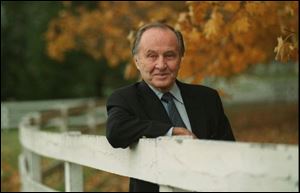
Titan of TV sports took us everywhere
6/10/2008"They're all gone."
With those three words, the innocence of sports died along with 11 members of the Israeli Olympics delegation on Sept. 5, 1972, in Munich.
And, with those three words, an elegant, humane reporter taught us from halfway around the world that journalism was alive and well and could be used in the same sentence with the word "class."
Jim McKay, who died Saturday at age 86, took us to more places and exposed us to more sports and cultures than anyone - ever - in his branch of the television business. No mere talking head, his eloquence set a standard that few sportscasters, if any, have approached.

Sportscaster Jim McKay found time to enjoy the quiet of his farm near Monkton, Md., when he wasn't traveling the globe.
For 36 years, from its debut on April 1, 1961, McKay hosted ABC's Wide World of Sports. It began that day with the Drake Relays and the Penn Relays and expanded into so much more. It was supposed to be a fill-in show for one summer. It became a part of our lives.
We squinted at small TV sets showing vague and fuzzy colors, if we were lucky. We watched Lucy, Andy and Opie, Lassie, Ed Sullivan, and Wide World. We watched once a week, every week, for as many weeks as there were in a TV year.
McKay set foot on every continent, reporting from small hamlets next to frozen Scandinavian lakes, from the backstretch of racetracks big and small, from clearings scratched into forests near giant redwoods, and from mammoth stadiums in faraway, exotic cities.
It was his voice on that goose-bump of an introduction: "Spanning the globe to bring you the constant variety of sport, the thrill of victory and the agony of defeat, the human drama of athletic competition."
And we would cringe just before the word agony, even though we knew what was coming, that poor ski jumper crashing and burning in the supreme moment of a dream being dashed.
But there were so many more thrills. McKay took us from hurling to curling, from demolition derby to roller derby, from log-splitting to drag-racing, to barrel jumping. He treated all with the same dignity that he would a major golf championship or the Preakness, and made those champions feel every bit as important and appreciated as, say, Mickey Mantle or Jim Brown.
McKay was a wordsmith, a writer at heart, who put words to pictures at the drop of a hat. He truly made it thrill or agony by the inflection of his smooth, rich voice.
But he will be remembered always for the ultimate agony. He and Munich, one of the 12 Olympic Games he hosted, are synonymous.
McKay was on the air that day, almost uninterrupted, for 16 hours. From the early morning when eight masked Palestinian terrorists from a group called Black September took hostages in the Israeli team compound, through the negotiations, through a failed rescue, through a dash to the airport, through false optimism, to the sorrowful conclusion.
"They're all gone," he said quietly, somberly of five athletes, four coaches, a referee and a judge. Sixteen hours reduced to three poignant words delivered by a visibly tired yet dignified man.
This business, sometimes for better and sometimes for worse, exposes me to a lot of TV types. Many are fine, upstanding men and women. Many are egotistical jerks who feel their medium makes them special. They probably think they're Jim McKays. They're not, although it's admittedly an unfair comparison.
I had the pleasure of spending a little time and talking with McKay on three occasions that I can remember - and I doubt I would have forgotten - and he was the warmest, least pretentious, most likable, most accommodating guy in the room. The absolute last image he would convey, or wish to convey, was that he was the star of the show.
Which, of course, he was, for so many of us, in so many shows, for so many years.